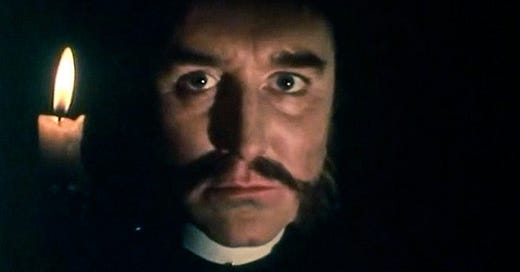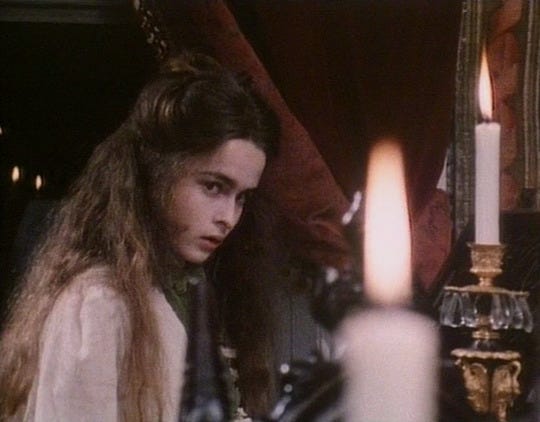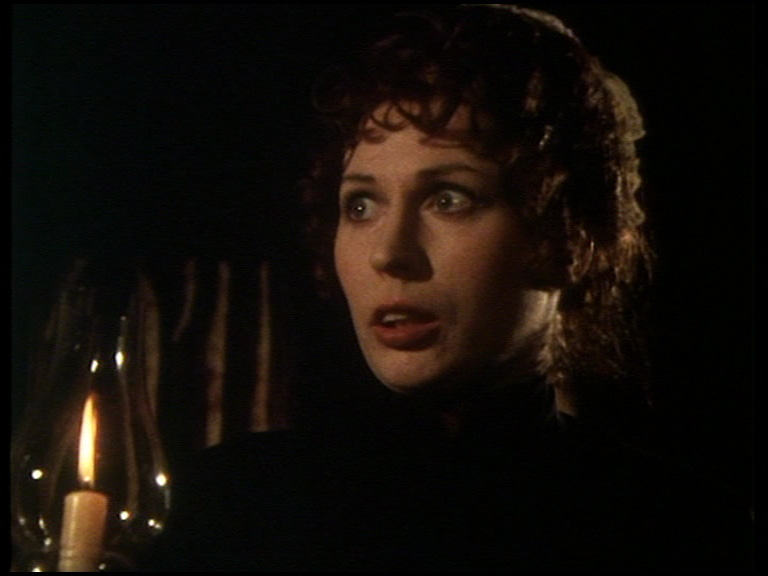Between 1971 and 1978, the BBC broadcast a classic ghost story over Christmas, adapted (with one exception) from the stories of M. R. James and directed (with one exception) by Lawrence Gordon Clark- one of the best directors in this most English and understated of genres; also responsible for ITV’s Casting the Runes (1979), four episodes of Flambards (1979) and the delightful A Pattern of Roses (1983), also based on a novel by the late K. M. Peyton and starring Whistler Wild-Child, Helena Bonham Carter, in Pre-Raphaelite mode. Clark’s films, now revered by connoisseurs and enthusiasts, have a stylish, rather literary simplicity, shot on murky 16mm film: un-flashy, stagey adaptations of the original yarns- with static camerawork (actors walking into shot), careful location choices (a raw English December and the ‘caw-caw’ of rooks) and a striving for historical accuracy (even if, sometimes, this doesn’t quite hit the mark) which younger audiences- accustomed to slick digital imagery, snappy editing, ‘amusing’ twists and contemporary acting skills (where modern actors fail to depict the past convincingly) might struggle with today.
The Stalls of Barchester (1971)- the first film in the Clark series - is one of the best. Robert Hardy stars as Dr. Haynes, the mutton-chopped, bewhiskered Victorian Archdeacon of Barchester Cathedral (Norwich, actually). He’s marvellous- as only Robert Hardy can be. I have a sneaky suspicion that we’ll be returning to Mr. Hardy on numerous occasions. He’s superb in slightly sinister roles: as a sadistic prep school headmaster in Young Winston (1972) or a country squire in Dark Places (1971)- an amusing British horror starring Christopher Lee, Joan Collins and Herbert Lom. As in all the best ghost films (Robert Wise’s The Haunting [1963] immediately springs to mind) you don’t see much. Fear is developed by suggestion alone, leaving things to a fevered imagination- although admittedly, in the work of M. R. James, supernatural entities do play their part- horrible, dusty, papery creatures ravaged by time.
16mm allowed Clark to explore the dark nooks and crannies of a mid-Victorian rectory (we’re in Borley territory), lit, most appropriately, by spluttering wax- a style in vogue during the 1970s, a decade which understood the nuances of Bohemian Hippie Gothic. Think Laura Ashley; think Tricia Guild.
And M. R. James (a Medievalist scholar and provost of Eton and King’s College, Cambridge) was, of course, poking fun at himself. An M. R. James ghost story needs to represent a certain, fusty antiquarianism. The comeuppance of a fussy, rational, confirmed bachelor- more at home with pipe tobacco, an illuminated manuscript and a round of golf: a dilemma for modern television producers. An old boy in tweeds pouring over leather-bound texts in the library of a Cambridge college or a country parson chanting the 23rd psalm, doesn’t quite cut the mustard with a contemporary audience accustomed to kitchen-sink angst, thrills, spills and the titillating sensation of Love Island. All the glamour of academic research; all the glamour of The Church of England. Which may explain Mark Gatiss’s struggle to fund his Christmas Ghost Story Revival. But then, just like that chain-smoking, clubbable dinosaur, Mister Bond, some things are best left alone. The past is another country; they do things differently there.
The Stalls of Barchester (1971) is available to watch on YouTube (there are various recordings of differing quality) and it’s currently showing on Talking Pictures (TPTV) Encore. Otherwise, your best best is the splendid BFI DVD (and Blu-Ray) ‘expanded’ boxed set, boasting six discs (13 hours of content), including all twelve films, plus all sorts of extra goodies- including the series narrated by the excellent Robert Powell and three episodes of the evocative series from 2000, featuring a bearded Christopher Lee as M. R. James.
I hope you enjoyed this review- a bonus post for Christmas. Otherwise, I'm posting a film recommendation every Friday morning (London time) so please join me over the coming weeks. It’s going to be fun.
Please subscribe by pushing the button below, and I look forward to reading your erudite comments. A BIG thank you to all those of you who have signed up. I really appreciate it. Newsletters will be free for the time being, but- looking ahead- I plan to move to a paid subscription model. Honestly, the holes in my socks worry me. And it would be nice to turn on the gas every once in a while.
My current thinking is a modest £5 a month, or £50 a year, which I reckon (maths was never my strong point) works out at approximately 96p per film (if you go for the yearly £50 option)- a bargain. And for free subscribers, there'll be a bonus post every six weeks or so (although I’m planning several bonus posts for Christmas) which won't cost you a penny and will remain free to read via the Luke Honey’s Weekend Flicks archive.
I hope you enjoy the rest of the Christmas break. And Happy Viewing!








